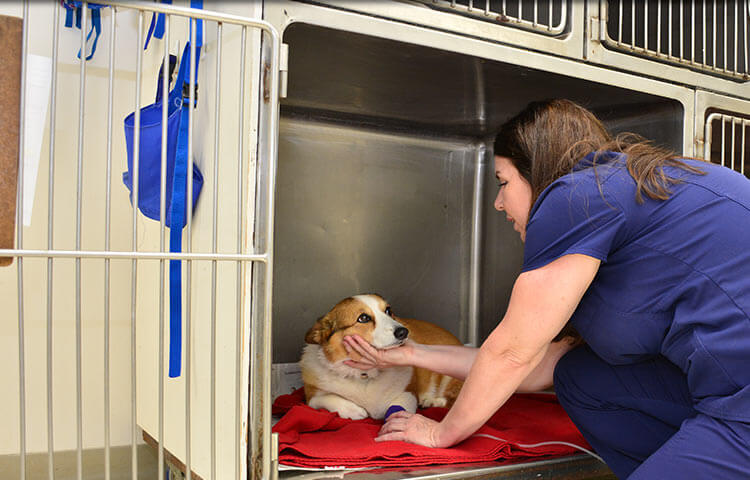Frequently Asked Questions
Understanding Your Pet’s Surgery: What to Expect and How to Prepare
Many pet owners have questions and concerns about their pet’s upcoming surgery. To help you feel more confident and prepared, we’ve outlined key information below. This guide also explains important decisions you’ll need to make before the procedure.

Lorem ipsum dolor sit amet, consectetur adipiscing elit. Ut elit tellus, luctus nec ullamcorper mattis, pulvinar dapibus leo.
Is the anesthetic safe?
Today’s modern drugs, technical skills, and anesthetic monitors have made surgery much safer than in the past. Here at Crystal Lake Veterinary Hospital, we do a thorough physical exam on your pet before administering anesthetics, to ensure that a fever or other illness won’t be a problem. We also adjust the amount and type of anesthetic used depending on the age and health of your pet.
Pre-anesthetic blood testing is important in reducing the risk of anesthesia. Every pet needs blood testing before surgery to ensure that the liver and kidneys can safely process the anesthetic. Even seemingly healthy animals can have serious organ system problems that cannot be detected without blood testing. If there is a problem, it is much better to find it before it causes anesthetic or surgical complications. If problems are detected, surgery will be postponed until the problem is corrected.
We perform pre-anesthetic bloodwork the morning of your pet’s surgery. It is tested in-house and we review results prior to any sedation. For geriatric or ill pets, additional blood tests, electrocardiograms, ultrasound or radiographs may be required before surgery as well.
It is important that surgery is performed on an empty stomach to reduce the risk of vomiting during and after anesthesia. You will need to withhold food and water for at least 8 to 10 hours before surgery. If your pet eats, there is high risk of vomiting which can end up in the lungs. This can lead to very serious problems.
Will my pet have stitches?
For many surgeries, we use absorbable sutures underneath the skin. These will dissolve on their own, and do not need to be removed later. The skin is then adhered with surgical adhesive or glue. Some surgeries, especially tumor removals, do require skin stitches or surgical staples. With either type of surgical closing, you will need to keep an eye on the incision for swelling or discharge. Most dogs and cats do not lick excessively or chew at the incision, but this is an occasional problem you will also need to watch for. We do offer restraint collars if needed. In cases where there are skin sutures, these will usually be removed 10 to 14 days after surgery.
You will also need to limit your pet’s activity level and refrain from baths for at least 10 to 14 days, regardless of closure method used.
Will my pet be in pain?
Anything that causes pain in people can be expected to cause pain in animals. Pets may not show the same symptoms of pain as people do. They usually don’t whine or cry, but you can be sure they feel it. Pain medications needed will depend on the surgery performed. Major procedures require more pain relief than things like minor lacerations.
Recent advances in pain medications have allowed for better pain control than ever before. We administer pain injections either before, during, and / or after surgery, depending upon the procedure. We typically dispense oral analgesics upon release of your pet to lessen the risk of discomfort and swelling. Both pain medication and antibiotics are given on a case by case basis. Some procedures require medication for just a few days and some require medication for several weeks.
Any animal who appears painful will receive additional pain medication. We do everything possible to ensure that your pet is comfortable and happy. If you feel your pet is in pain and / or you are concerned about post-operative healing, please contact us immediately for follow-up care.
What other decisions do I need to make?
While your pet is under anesthesia, it is sometimes the ideal time to perform other procedures, such as dentistry, ear cleaning, or implanting an identification microchip. If you would like an estimate for these extra services, please call ahead of time.
In cases where we are removing a growth, the Vet may recommend that we send a tissue sample to our lab to be analyzed. It typically takes 3 – 5 days for results to be returned. Understanding histopathology results will help you and our Vet develop a game plan for ongoing treatment. You will need to decide if you want to do this.
When you bring in your pet in for surgery, we will need 5 to 10 minutes of your time to get you checked-in and make decisions on the blood testing and other options available. In most cases, you will see the DVM prior to dropping-off your pet. When you pick up your pet after surgery, you should also plan to spend about 10 minutes to go over your pet’s home care needs.
If someone other than the primary pet owner is dropping-off or picking-up, it is important that this person is equipped to answer these important questions. Finally, it is critical that we are able to reach you the day of surgery. We request both a primary and secondary phone number in all cases. Please plan accordingly.
We will call you the day before your scheduled surgery appointment, to confirm the time you will be arriving with your pet and to answer any questions you might have. We will also call you the day after surgery to see how your pet is recovering. Please do not hesitate to call us, at any time, with questions about your pet’s health or surgery.


